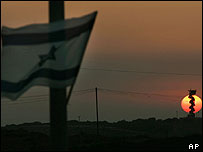|
By Alan Johnston
BBC News, Gaza
|


The hotels at Gush Katif settlement closed a
long time
ago |
In the
ruins of the Palm Beach Hotel, you get a sense that an era is
drawing to an end, that Israel's settlement project in Gaza is
entering its last days.
Since the outbreak of the Palestinian uprising, Gaza has become a
violent, dangerous place.
People don't come on holiday anymore.
The Palm Beach resort complex, in the southern Gush Katif
settlement bloc, was abandoned years ago.
And everything that the Israelis have built here - nearly 20
settlements housing several thousand people - will be abandoned if
Ariel Sharon's plan to withdraw from Gaza goes ahead in August.
Squatters
The Palm Beach's reception and dining room have been stripped of
fixtures and furniture. The wind off the sea blows in across floors
strewn with broken glass.
 |
 I love Gush Katif. Great beaches. Good
surf. Good fishing. It will be very difficult to leave I love Gush Katif. Great beaches. Good
surf. Good fishing. It will be very difficult to leave

|
A surfer called Elazaar Elchiam is among a handful of young
Israelis who live in the decaying hotel, squatting in an apartment.
He grew up in a nearby settlement, but he knows that this may well
be his last summer on Gaza's beach.
"Since I was little, I've been coming down to the sea," he says.
"I love Gush Katif. Great beaches. Good surf. Good fishing. It will
be very difficult to leave."
The settlers have been outraged by the disengagement plan from
the outset - and many are determined to resist it to the end.
Action planned
In recent weeks, empty apartments in the Palm Beach complex have
begun filling up with what are being described as reinforcements.
These are supporters of the settlement movement from the West
Bank or Israel itself who will be here for any showdown with the
army when the evacuation begins.
 |
 It is too hard to think that they are
going to give it to terrorists It is too hard to think that they are
going to give it to terrorists 
|
The settlers are appalled by the possibility that their homes may
be taken over by Palestinian militants who have been attacking Gush
Katif for years.
To prevent that happening, the Israelis may demolish all their
property before they leave.
"You don't want to destroy what you built," says Debbie Rosen,
who raised her six children in Gush Katif. "It's home with all the
memories that you grew up with... It's my kids, it's my garden, my
flowers that I just planted. It's home.
"On the other hand, it is too hard to think that they are going
to give it to terrorists. Terrorists that killed my best friends -
and they are going to celebrate in my home. It's too hard."
Loathing
Under international law, Gaza has been occupied territory since
Israeli troops captured it in 1967.
By establishing civilian settlements here, Israel breached the
Geneva Conventions - the rules of warfare. But for the settlers,
this is meaningless.
"I never relate to my home as occupied territory," says Debbie
Rosen, who thinks of Gaza as part of Israel - part of the land that
God promised the Jews.
 |
 We are guilty... they want a country We are guilty... they want a country

|
But just a few kilometres away, in the Palestinian town of Khan
Younis, the occupation is far from meaningless. It is hated, and the
settlements - and the soldiers who protect them - are regarded as
its purest form.
For decades the Israeli presence has twisted and restricted and
endangered Palestinian lives in many ways.
For the people of Khan Younis, the beach at Gush Katif used to be
an escape from the summer heat in their poverty-stricken alleyways.
But since the outbreak of the Palestinian intifada (uprising),
the army has blocked their route to the sea. Khan Younis has lost
its beach.
And nobody has lost more than Mohammad Shaath. He used to operate
a cafe on the beach - the Cafe El Andalus. But the army's
restrictions have meant that he has not been able to see it for
years.
As a foreigner, I could make the short trip easily. And I found
the cafe - gone to ruin.
The sands of the beach have invaded the terrace, where
Palestinians used to enjoy fresh fish, drink coffee and sit and
watch the sea.
While his cafe has rotted, Mr Shaath, up in Khan Younis, has been
unemployed - sinking gradually into poverty. He says that if the
Israelis go, he'll take out a loan and bring the El Andalus back to
life.
Differing views
The settlers would certainly say that Mr Shaath should blame his
troubles on the militants who launched the intifada and began
attacking the settlers.
The army only blocked the Palestinian road to the beach because
it would have been very dangerous to allow easy access to the
settlement area.
But there was a voice of dissent among the settlers.
A young man on the beach said he understood what drove the
Palestinian militants.
He said that when Israelis were fighting to establish an
independent state in the 1940s, they resorted to violence.
The young settler clearly felt that the Palestinians had endured
injustice at Israel's hands. "We are guilty," he said. "They want a
country."
